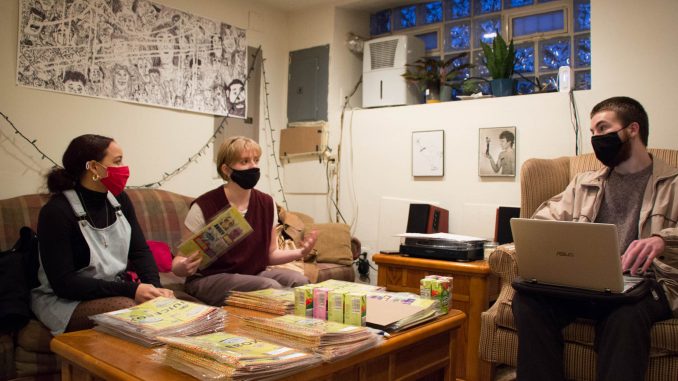
A turn of JuiceBox Magazine’s bright yellow cover reveals poetry, art and interviews diving into issues demanding this generation’s attention.
JuiceBox is an alternative magazine created by a group of five Temple University students, two alumnae and two of their friends, that highlights written and artistic work that address social issues, like racial justice and social media use. The magazine, which sells for $10 an issue, began distributing on Jan. 13 and raised more than $1,000, all of which will be used to purchase winter coats to donate to Project HOME, a nonprofit organization that addresses homelessness in Philadelphia.
JuiceBox’s articles, written by the creators and guest writers, cover topics ranging from police brutality to sexual liberation to women’s sexuality.
“We are mostly talking about stuff that impacts people our age, college-aged, maybe even high school-aged people, and how kind of we’re processing all of these things that are happening to us,” said Mary Williams, a 2020 film and media arts alumna and editor and designer of JuiceBox.
JuiceBox was available for preorder on the team’s Instagram page starting Jan. 1, and the first edition sold out by Jan. 6, said Andrew Caplan, a senior political science major and editor-in-chief of JuiceBox. Once distribution began, the team began sending the magazine by mail and delivering them in person around Philadelphia.
The first issue includes stories like “Modern Body Image,” an article about how technology and social media impacts body image, written by Williams, “Ten Dollar Rum to Teargas,” an article by Caplan about Black Lives Matter protests and an interview with Lami Tolla, a Philadelphia street artist.
The nine creators, Williams, Caplan, Connor Bickhart, a former Temple student, Yagmur Kocaoglu, a junior architecture major, Maya Sutton, a senior human development and community engagement major, Tyler Kimble, a former Temple student, Joy Wilson, a senior recreational therapy major, Julia Brumbaugh, a 2020 advertising alumnus and Elaina Graca, a senior photography major, met in Johnson and Hardwick Halls and have remained close since. They were inspired to create JuiceBox after watching the documentary “Dumb: The Story of Big Brother Magazine” about a skateboard magazine founded in the 1990s, said Graca, the creative director of JuiceBox.
Graca and Caplan separately watched the documentary and felt inspired to start a magazine, and decided to pursue the project during a conversation on the way home from the airport.
“From then it was just kind of like, set that we were going to do this,” Graca said.
The creators are reaching out to Philadelphia artists, like podcasters and poets, to get more people involved in their magazine and promote them, Williams said.
“People in our community that are kind of doing their own thing that might not have like, as big of a platform as they should have because these are very creative and inspiring people,” she added.
Erin Rafferty, a 2020 film and media arts alumna, preordered the magazine because she likes to support art made by Temple students and alumni. She is excited to see junior printmaking major Liv Potter’s artwork and digital illustrations featured in the first issue, she said.
“It will be fun to read some stories. I’m not much of a reader, but if it’s in magazine format, which this seems like a little book almost,” Rafferty said. “It might help me get back into reading because it’s small stories and cool things.”
While the team used digital software like Adobe Illustrator and InDesign to create the magazine, it will only be released independently as a hard copy, part of what differentiates the magazine from online-only publications, Caplan said.
“In this digital age, we’re not really like focusing on the digital aspects of it,” he added.
JuiceBox was printed with MagCloud, an online company that prints magazines, flyers, pamphlets and other publication types, Caplan said.
The individual team members funded the initial printing costs, and the shipping costs are covered by a private donation the magazine received, Caplan said.
Graca hopes JuiceBox gathers people who are frustrated with social issues and makes a space for ideas, feelings and solutions to be expressed, she said.
“We all kind of have this understanding that we are the generation that has been left to fix so many things and we’re very frustrated with that,” she added. “We’re just kind of trying to navigate that burden that has been sort of placed on us.”
JuiceBox will likely have a second issue coming out toward the end of the Spring 2021 semester and will also be donating its profits to a charity, although they do not know which one yet, Graca said.
“We’re trying to kind of see the power that each of us have in ourselves and the power in our voices that we have and like, the ways that we can come together to make sure that our power is being used and actually serving in a productive and progressive way,” she added.



I love it.
This is a way to really get your true feelings about our communities out to others who may not understand what is going on outside of theirs.
A chance to see outside of your own back yard.